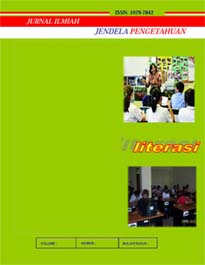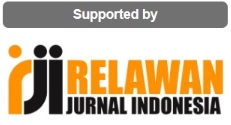Integration of Local Wisdom in Sustainable Ecotourism Management from the Perspective of Indigenous Communities
Integrasi Kearifan Lokal dalam Pengelolaan Ekowisata Berkelanjutan dari Perspektif Masyarakat Adat
Abstract
With time, the terminology of ecotourism continues to evolve. This study aims to explore the role of local wisdom in the sustainable management of ecotourism from the perspective of indigenous communities in Indonesia. This research focuses on how traditional knowledge and practices can be integrated into ecotourism management to support environmental sustainability, enhance the economic welfare of local communities, and strengthen cultural identity. The research method used is a literature review, examining relevant journals and literature from the past five years. The findings show that the active involvement of indigenous communities in ecotourism management, as seen in Komodo National Park, the Subak system in Bali, and indigenous communities in North Sulawesi, can yield significant benefits. Indigenous community participation increases conservation awareness, community participation, and fair distribution of economic benefits. However, challenges such as lack of policy support and conflicts of interest must be addressed. This study recommends developing policies that recognize and value local wisdom, capacity building for indigenous communities through training and education, and implementing participatory approaches at every stage of ecotourism project planning and execution
Downloads
References
Andriana, E., Yuliana, R., Ilmiah, W., Aulina, C., Noviyanti, T. E., & Ramadayanti, S. (2022). Pemberdayaan Ekowisata Berbasis Kearifan Lokal. Jurnal Pemberdayaan Masyarakat, 1(2), 52–60. https://doi.org/10.46843/jmp.v1i2.267
Aspiany, Anggoro, S., Purwanti, F., & Gunawan, B. I. (2019). Strategies for sustainable ecotourism development in the marine waters of bontang city, Indonesia. AACL Bioflux, 12(5), 1779–1787. https://www.proquest.com/docview/2350124648
Bagul, A. H. B. P. (2009). Success of Ecotourism Sites and Local Community Participation in Sabah. In Victoria University of Wellington (Issue January 2009).
Buckley, R. (2009). Ecotourism: Principles and practices. CABI.
Das, M., & Chatterjee, B. (2015). Ecotourism: A panacea or a predicament? Tourism Management Perspectives, 14, 3–16. https://doi.org/https://doi.org/10.1016/j.tmp.2015.01.002
Epler Wood, M. (2017). Sustainable tourism on a finite planet: environmental, business and policy solutions. Routledge.
Geria, I. M., Nastiti, T. S., Handini, R., Sujarwo, W., Dwijendra, A., Fauzi, M. R., & Juliawati, N. P. E. (2023). Built environment from the ancient Bali: The Balinese heritage for sustainable water management. Heliyon, 9(11), e21248. https://doi.org/10.1016/j.heliyon.2023.e21248
Gustave, R., & Borchers, H. (2017). Conservation and Conflict in Komodo National Park. Angewandte Chemie International Edition, 6(11), 951–952., 6(2), 5–24. http://repo.iain-tulungagung.ac.id/5510/5/BAB 2.pdf
Hall, C. M., & Lew, A. A. (1998). Sustainable tourism. A geographical perspective.
Hartoyo, A. P. P., Sunkar, A., Fadillah, A., Hidayati, S., Winata, B., & Hadi, A. N. (2021). Vegetation cover analysis and ecotourism business model for sustainable forest management in Gunung Leuser National Park, Indonesia. IOP Conference Series: Earth and Environmental Science, 771(1), 12001. https://doi.org/10.1088/1755-1315/771/1/012001
Hitchcock, M. (2023). Tourism, development and terrorism in Bali. Routledge.
Iman, S. A., Chusmeru, C., Adi, T. N., & Runtiko, A. G. (2022). Community Empowerment as Socio-Economic Education of Tourism Villages Based on Local Wisdom. Education Quarterly Reviews, 5(3), 54–67. https://doi.org/10.31014/aior.1993.05.03.524
Indiarti, W., & Munir, A. (2016). The Implementation of Community-based Ecotourism Concept in Osing Tourism Village Development Strategy of Banyuwangi Regency, Indonesia. Proceedings of the Asia Tourism Forum 2016 - the 12th Biennial Conference of Hospitality and Tourism Industry in Asia, 72–77. https://doi.org/10.2991/atf-16.2016.10
Jaya, P. H. I., Izudin, A., & Aditya, R. (2024). The role of ecotourism in developing local communities in Indonesia. Journal of Ecotourism, 23(1), 20–37. https://doi.org/10.1080/14724049.2022.2117368
Maduriana, I. M., & Gata, I. W. (2021). Integrasi Pendidikan Biologi dalam Konservasi Lembu Putih Taro Berbasis Kearifan Lokal. Jurnal Pedagogi Dan Pembelajaran, 4(3), 450. https://doi.org/10.23887/jp2.v4i3.41349
McDonald, J. R. (2009). Complexity science: an alternative world view for understanding sustainable tourism development. Journal of Sustainable Tourism, 17(4), 455–471. https://doi.org/10.1080/09669580802495709
Mulyoutami, E., Rismawan, R., & Joshi, L. (2009). Local knowledge and management of simpukng (forest gardens) among the Dayak people in East Kalimantan, Indonesia. Forest Ecology and Management, 257(10), 2054–2061. https://doi.org/https://doi.org/10.1016/j.foreco.2009.01.042
Norken, I. N., Suputra, I. K., & Arsana, I. G. N. K. (2015). Water Resources Management of Subak Irrigation System in Bali. Recent Decisions in Technologies for Sustainable Development, 776, 139–144. https://doi.org/10.4028/www.scientific.net/AMM.776.139
Prasetyo, N., Carr, A., & Filep, S. (2020). Indigenous Knowledge in Marine Ecotourism Development: The Case of Sasi Laut, Misool, Indonesia. Tourism Planning & Development, 17(1), 46–61. https://doi.org/10.1080/21568316.2019.1604424
Purnomo, H., Mendoza, G. A., & Prabhu, R. (2005). Analysis of local perspectives on sustainable forest management: an Indonesian case study☆☆This study was funded through a collaborative project between the University of Illinois and the Center for International Forestry Research (CIFOR). The ideas contained herein are solely of the authors and do not necessarily reflect official views of CIFOR. Journal of Environmental Management, 74(2), 111–126. https://doi.org/https://doi.org/10.1016/j.jenvman.2004.08.013
Ross, S., & Wall, G. (1999). Evaluating ecotourism: The case of North Sulawesi, Indonesia. Tourism Management, 20(6), 673–682. https://doi.org/https://doi.org/10.1016/S0261-5177(99)00040-0
Sanggrangbano, A., & Firmansyah, F. (2020). Ecotourism Development-based on Local Wisdom of Coastal Community in Biak Numfor Regency Papua Province. https://doi.org/10.4108/eai.21-10-2019.2294347
Sibila Lebe, S., & Milfelner, B. (2006). Innovative organisation approach to sustainable tourism development in rural areas. Kybernetes, 35(7/8), 1136–1146. https://doi.org/10.1108/03684920610675139
Suacana, I. W. G., Wiratmaja, I. N., & Sudana, I. W. (2023). Ecotourism-Based Model Development Strategy Local Wisdom of Indigenous People in Ubud Bali Indonesia. Migration Letters, 20(6), 325–335. https://doi.org/10.59670/ml.v20i6.3484
Suarja, I. G., & Thijssen, R. (2023). Traditional water management in Bali. Leisa, 19(3), 25–29. https://edepot.wur.nl/567051#page=25
Susanti, R., & Zuhud, E. A. M. (2019). Traditional ecological knowledge and biodiversity conservation: The medicinal plants of the Dayak Krayan people in Kayan Mentarang National Park, Indonesia. Biodiversitas, 20(9), 2764–2779. https://doi.org/10.13057/biodiv/d200943
Syahrial, S., Asria, A., Maison, M., Kurniawan, D. A., & Nugroho, M. T. (2021). Integration of Local Wisdom Mangrove Ecotourism in Class IV Learning in Elementary School. Jurnal Iqra’ : Kajian Ilmu Pendidikan, 6(2), 61–70. https://doi.org/10.25217/ji.v6i2.1142
Syamsi, M. N., & Lee, J. (2021). A Longitudinal Study of the Local Community Perspective on Ecotourism Development in Lombok, Indonesia. In Water (Vol. 13, Issue 17). https://doi.org/10.3390/w13172398
Wiratno, W., Withaningsih, S., Gunawan, B., & Iskandar, J. (2022). Ecotourism as a Resource Sharing Strategy: Case Study of Community-Based Ecotourism at the Tangkahan Buffer Zone of Leuser National Park, Langkat District, North Sumatra, Indonesia. In Sustainability (Vol. 14, Issue 6). https://doi.org/10.3390/su14063399
Zakia, Z. (2021). Ecotourism in Indonesia: Local Community Involvement and The Affecting Factors. Journal of Governance and Public Policy, 8(2), LAYOUTING. https://doi.org/10.18196/jgpp.v8i2.10789
















